Pride month is in full swing here at DC.com and across the country. In our current climate, it’s never been more important to embrace your identity and celebrate the parts of you that form the person you are. But while pride is a lifelong journey, taking the first step can always feel like the most daunting. In a world full of prejudice, just being honest with the world about who you are can take courage worthy of a Green Lantern. It’s a challenge that millions of people around the world have to face…and one that even some of our greatest heroes have had to surmount as well. Here are five inspiring, illuminating and heartwarming stories about coming out in the DC Universe.
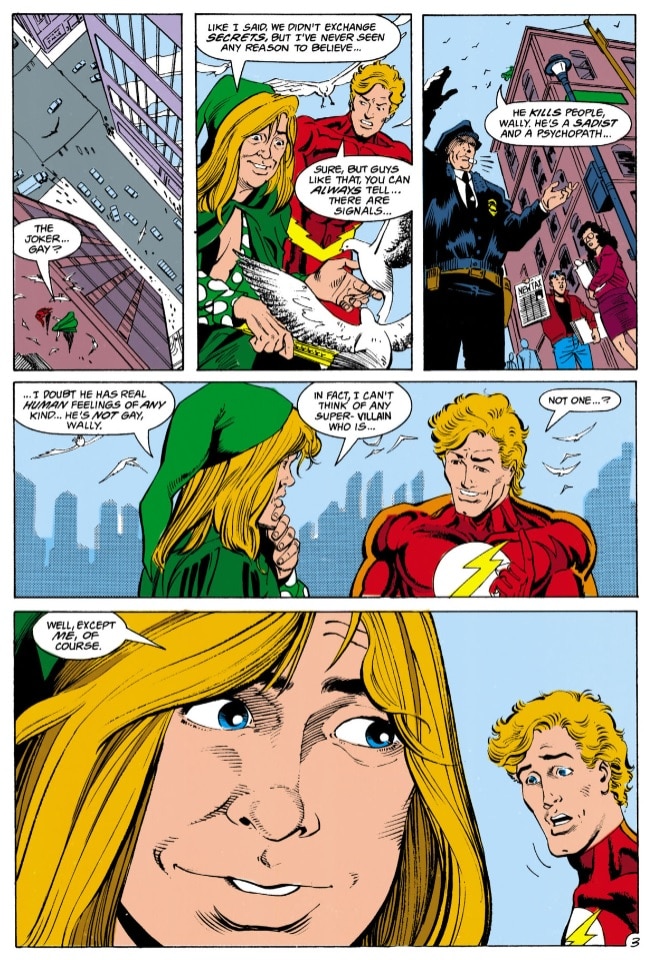
1) Pied Piper – The Flash #53, 1991
At a time when widespread gay panic was even more prevalent than it was today, William Messner-Loebs was breaking new ground in The Flash. In The Flash #53, Loebs gives Hartley Rathaway, the longtime Flash rogue known as the Pied Piper, a sympathetic turn by giving him a heart-to-heart talk with Wally West about his personal identity. More than that, Hartley takes to task the historical “gay coding” of villains throughout popular media, up to and including the Joker, which subtly instills mistrust of people with attributes associated with gay communities in children from a young age. Hartley knows that hatred is learned—whether it’s another group or yourself—but it’s also something that can be unlearned.
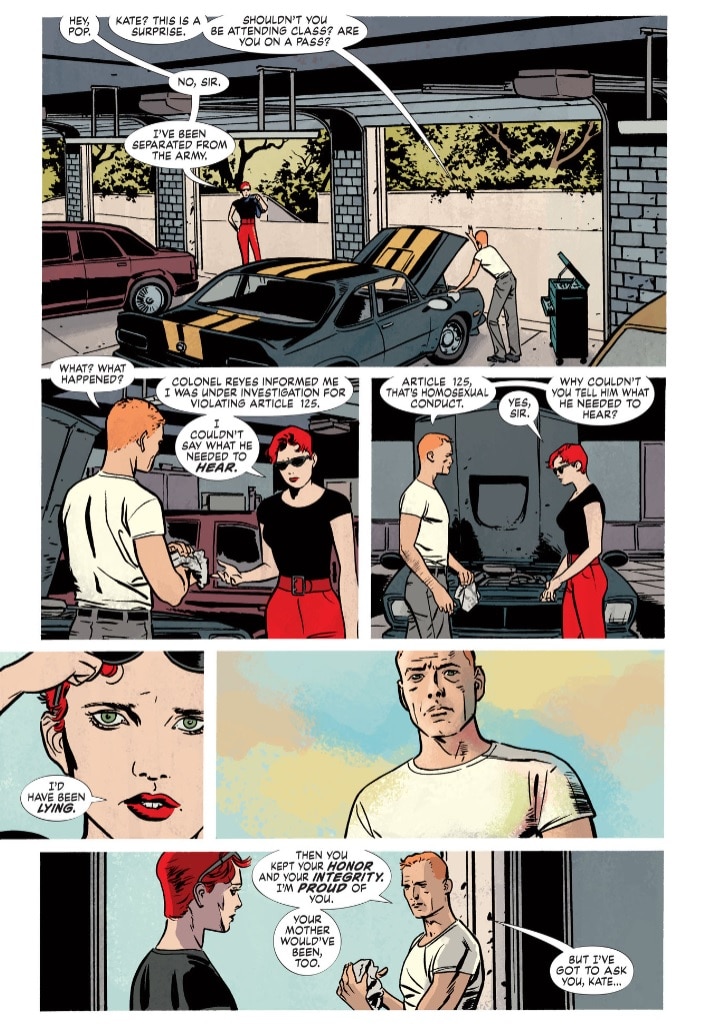
2) Batwoman – Detective Comics #859, 2009
Let’s be clear, the wrong way to do a coming out story is to put the focus on the cisgender straight protagonist’s reaction to the revelation of queer identity, whether it’s one of acceptance or not. In a true coming out story, the hero must be the queer person themselves.
While it’s true that Batwoman’s coming out story is emotional because of the surprising acceptance and pride she received from her father, she always remains the focus. We see how Kate sacrifices her dreams when they come into conflict with the value she places on her identity and living in truth. We also see how she confronts her father, unflinching, with the reality of her dismissal from the military under the now thankfully antiquated policies of “Don’t Ask, Don’t Tell.” Jacob Kane’s acceptance of his daughter’s truth, and even more so, the morality that compelled her to stand by it, is a best-case scenario for anyone who fears coming out. But it’s an important illustration that even when you feel like your world may shatter in contact with your truth, the people who care the most will stand by your side.
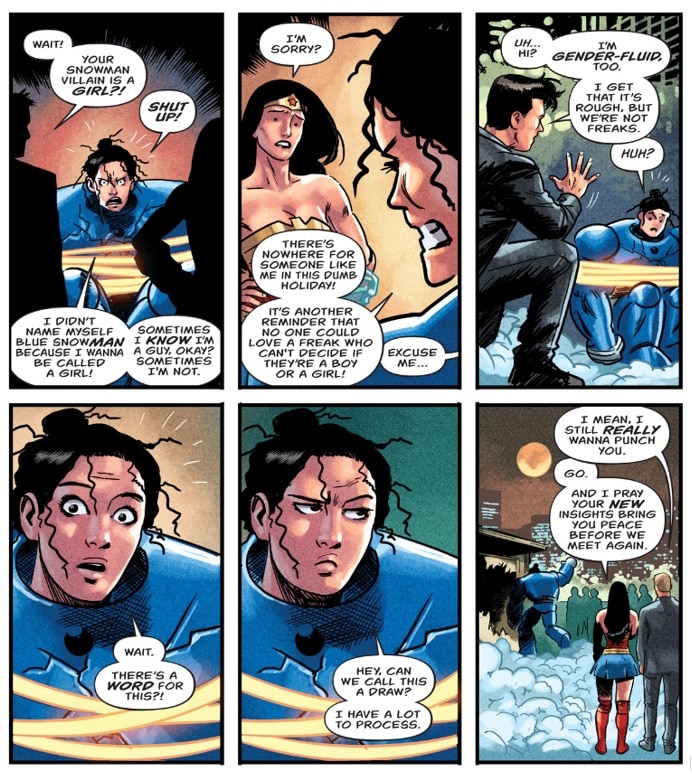
3) Blue Snowman – DC: Love is a Battlefield #1, 2021
Non-traditional gender expression has always played a role in Wonder Woman history. And like so much of Wonder Woman’s world, the Golden Age was her most unabashedly queer era before the modern age. Of particular relevance here is how many of Wonder Woman's Golden Age rogues, such as Doctor Poison, Hypnota and Blue Snowman, were originally depicted as women who presented themselves as men. Since then, when Blue Snowman, civilian identity Byrna Brilyant, has been remembered by comics at all, her so-called “gender issues” were played off as comedy. But we’re gratefully living in a period where these conversations about identity can once again be frankly held in the open.
In DC: Love is a Battlefield, a confused and enraged Blue Snowman attacks a popular Valentine’s Day date spot out of feelings of otherness and isolation fostered by the traditional sexual roles glorified by the holiday. It’s only in their discovery of someone else who feels the same way for the first time that they have the language to define where they stand, and that there is a place where they belong.
As an asexual person, Blue Snowman’s story is one I feel on a deeply personal level. It’s very easy to feel like you don’t belong when you’re denied even the language or basic education of the sexual and gender spectrum beyond the basic binary. Blue Snowman illustrates just how important a broad sexual education can be, and how much pain it might save in the long run to learn that your feelings are valid, even when it’s hard to find others who feel the same way.
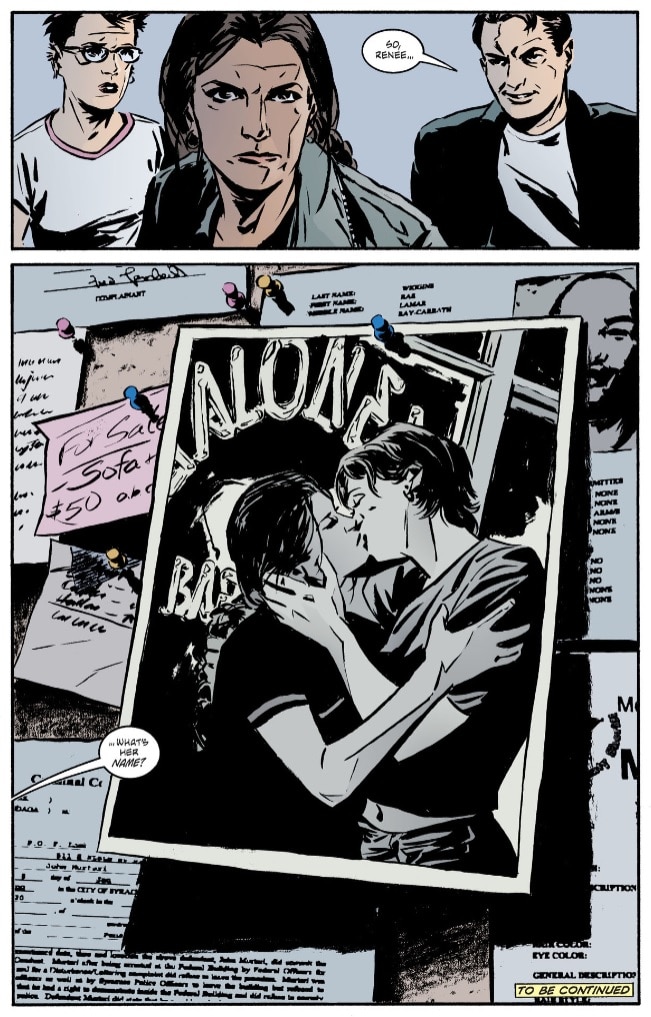
4) Renee Montoya – Gotham Central #6, 2003
This Eisner-winning story by Greg Rucka is about the dark side of coming out—especially when it’s not done on your own terms. In this often painful storyline, a vindictive Two-Face outs Renee as a lesbian before she is ready to become public with her identity, breaking her personal and professional life into shambles. This point cannot be stressed enough: while coming out is an act of bravery, outing someone else, under any circumstances, is a clear violation of a person’s space, identity and privacy. Not only is it never acceptable, no matter your intentions, Rucka here makes the reality very clear: outing another person is, plain and simple, the act of a super-villain.
If you suspect someone might be hiding their identity, or even if they privately confide it in you before telling others, it is your moral duty to keep that information to yourself. Coming out is always, ALWAYS a personal decision. Your role in another’s is never to talk, but to listen.
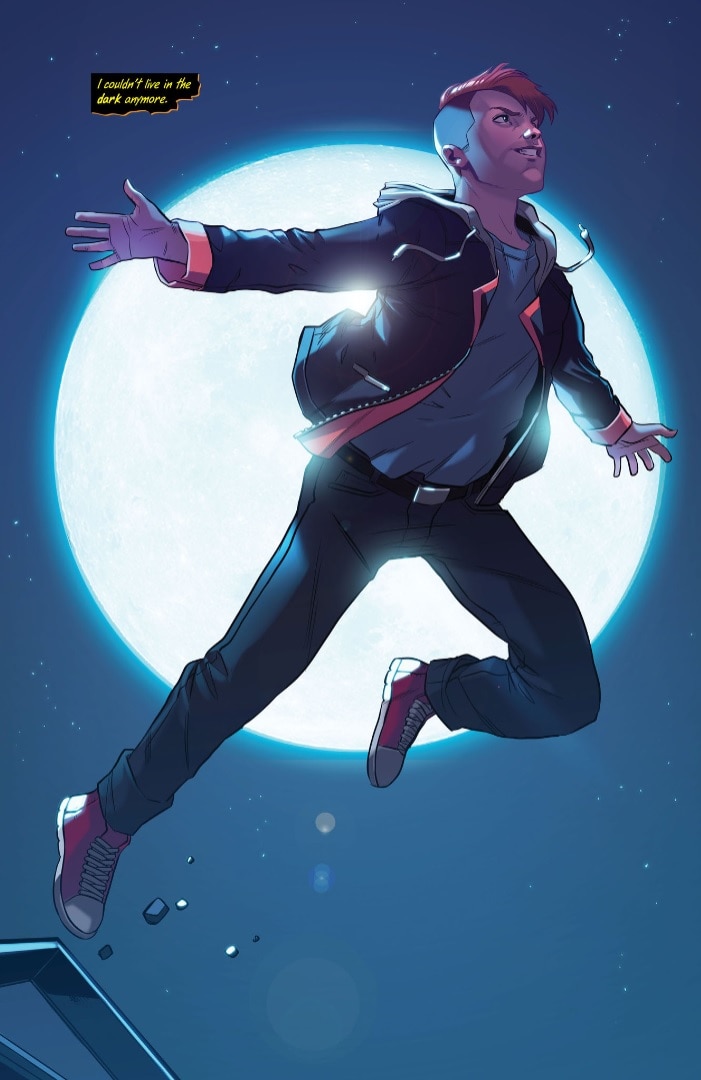
5) The Ray – Justice League of America: Rebirth - The Ray #1, 2017
From the very beginning of the genre, the superhero story has always been about a dual identity. Living one life in public, and another in private. People keeping parts of their own identity secret as a tactic of social survival have empathized with the likes of Batman and Superman for decades, for this very reason.
Writer Steve Orlando, known well for the queer themes prevalent throughout his work, made this subtext overt in his 2017 origin story for the Ray. As a boy literally forced to live in the dark his entire life, it’s only when the Ray embraces the light which gives him his brilliant powers that he is also finally able to accept another part of his identity: his reality as a young gay man. Scary as it may be, life can be so much simpler, so much more joyful, after taking that step into the sun. After all, as Ray himself confides with the reader upon his luminescent debut: “Crazy how much easier it is to find a guy when you’re visible.”
Alex Jaffe is the author of our monthly "Ask the Question" column and writes about TV, movies, comics and superhero history for DC.com. Follow him on Twitter at @AlexJaffe and find him in the DC Community as HubCityQuestion.
NOTE: The views and opinions expressed in this column are solely those of Alex Jaffe and do not necessarily reflect those of DC Entertainment or Warner Bros., nor should they be read as confirmation or denial of future DC plans.




















